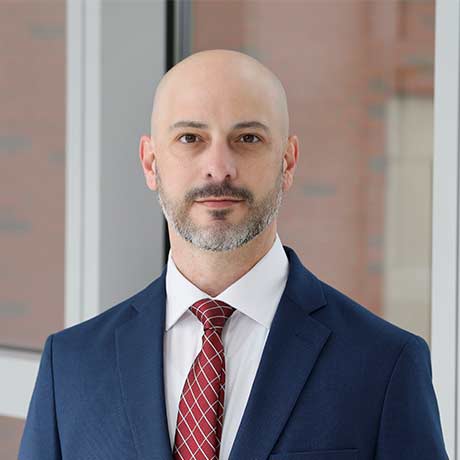
The solutions are out there: Dr. Garner seeks to share interventions to combat the HIV epidemic and substance use disorders
By Tyler Griesenbrock
CATALYST scientific editor
Published December 12, 2022
 What good is a solution that no one is using to solve the problem it is meant to address?
What good is a solution that no one is using to solve the problem it is meant to address?
For Dr. Bryan Garner – an experimental psychologist who is the new director of the Program in Dissemination and Implementation Science in CATALYST (the Center for the Advancement of Team Science, Analytics, and Systems Thinking in Health Services and Implementation Science) and a professor in the Division of General Internal Medicine – it means an opportunity to improve health care and the organizations that practice it by fostering awareness, adoption, and implementation of solutions that are backed by scientific evidence.
“Dissemination and implementation science helps evidence-based practices that have been shown to be effective in research settings be implemented in real-world practice settings.” he said. By finding ways to improve the adoption and implementation of these practices, Dr. Garner aims to improve public health on a large scale.
“My program of research is focused on developing effective and cost-effective strategies to help organizations and their staff implement evidence-based practices,” he said. “Beyond expecting this of organizations and their staff, it takes supporting and rewarding them.”
The Implementation and Sustainment Facilitation (ISF) Strategy is a support strategy that Dr. Garner and his team have found to be both effective and cost-effective. The ISF Plu$ (ISF+) Strategy, which also rewards staff using modest monetary incentives, is a support and reward strategy that an ongoing study is suggesting is even more effective.
To help accelerate the process of translating research-based evidence into practice, Dr. Garner and his team regularly use effectiveness-implementation hybrid trial designs.
Hybrid trial designs have “a lot of potential to accelerate progress because they focus on effectiveness research questions and implementation research questions at the same time,” he said. “It’s a great design to help speed up the process.”
Dr. Garner’s hybrid trials have the support of the National Institute on Drug Abuse (NIDA), which funded three efforts on which he serves as Principal Investigator/Multiple Principal Investigator.
“NIDA is part of the National Institutes of Health (NIH), which is the largest funder of research in the world, so it’s exciting to be conducting research that they’re funding,” he said.
Dr. Garner is also part of the NIDA-funded HEALing Communities Study, a multi-state effort to reduce opioid overdose deaths that includes the efforts of many CATALYST faculty and staff members.
In addition to his dissemination and implementation work related to substance use disorder and the HIV epidemic, Dr. Garner has contributed to advances in areas such as the retention of staff members who have been trained in the use of evidence-based practices, the continued employment of such practices over time, and the effect of the use of those practices on racial disparities related to the completion of treatment.
Looking ahead, Dr. Garner plans to leverage his new roles to help Ohio State accelerate its dissemination and implementation research efforts across the university. That puts him on a course to become a leader in the field, which will allow him to continue to spread evidence-based practices to those who need them but may not yet know about them or know how best to put them into use.
For more information about Dr. Garner, visit https://medicine.osu.edu/find-faculty/clinical/internal-medicine/bryan-garner or follow him on Twitter @DrBryanGarner.
For more information about CATALYST and the work done at the Center, visit https://go.osu.edu/catalyst.
